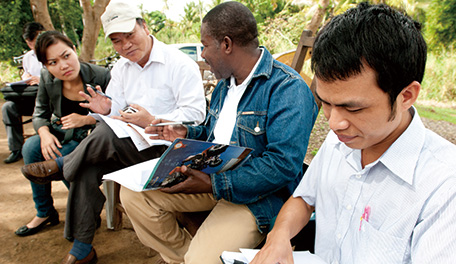Japan's Official Development Assistance White Paper 2012
ODA Topics
Post Busan and Emerging Countries
In recent years, a significant change has occurred in the development architecture. Within the world economy, the influence of emerging countries is rapidly expanding, and necessity to respond to global development issues such as climate change, infectious diseases and food security are growing increasingly important. In responding to such issues and needs, attention has begun to focus not only on the traditional aid donors, but also on the role that new actors of development, such as the private sector, civil society and emerging countries. The private sector is said to actually account for around 70% of financial flows to developing countries. Likewise, according to estimates of the OECD Development Assistance Committee (DAC), the volume of assistance in 2008 from the emerging donors such as China, Saudi Arabia, Brazil and India was as high as 10% of the total volume of the DAC member countries’ ODA.
With this background of the changing climate surrounding aid, the "Fourth High Level Forum on Aid Effectiveness" (hereinafter the Busan HLF), a major international conference, was held in Busan, Republic of Korea at the end of November 2011.
The Busan HLF was a ministerial level meeting held to discuss how to enhance the effectiveness of future development and of cooperation between donor countries international organizations and developing countries. In the Busan HLF, it was newly agreed that "respect for the ownership of developing countries," "emphasis on results", "inclusive partnership" and "transparency of aid and fulfillment of accountability" are major principles to achieve the development goals of the international community. Likewise, the importance of wide-ranging actors such as in particular, "emerging countries," "actors of triangular cooperation/south-south cooperation" and the "private sector" was confirmed.
While a characteristic of the Busan HLF was the participation of many new actors of development, half a year after the Busan HLF in June 2012, the "Global Partnership for Effective Development Cooperation" (hereinafter, the Global Partnership) was established officially as a new framework in which wider range of development actors could participate. As opposed to the past discussions on the enhancement of aid effectiveness which were carried out primarily among the traditional donor countries and international organizations, and also within the DAC, the activities of the Global Partnership will commence under the joint efforts of the DAC and United Nations Development Programme (UNDP) as a forum held where new development actors such as emerging countries and the private sector participate.
Within the Global Partnership, in order to push forward more effective development cooperation, a discussion among participants is scheduled concerning the way in which development issues of a global scale should be handled, and the extent of the progress of efforts that each participant committed to in the Busan HLF. The Global Partnership is an epoch-making forum in the sense that it gathers the traditional donor countries, emerging countries, the private sector, civil society and furthermore, the aid recipient countries to discuss development issues. The ministerial-level meeting of the Global Partnership is co-chaired by the Secretary of State for International Development of the United Kingdom Justine Greening representing the developed countries, Finance Minister Ngozi Okonjo-Iweala of Nigeria representing the developing countries, and the National Development Planning Minister Armida Alisjahbana of Indonesia representing the emerging countries. Emerging countries are expected to play a unique role as a bridge between developing countries and developed countries through sharing their own experiences of growth with developing countries and as the countries that are in the developmental stage to maintain a close acquaintance with and listen to developing countries. Emerging countries themselves are also in the process of acquiring experience as donor countries, so are required to study the rules and procedures of aid implementation that have been practiced within the international community in the past, and implement aid accordingly. At the same time, rather than the conventional donor-nation/recipient-nation relationship with emerging countries, developed countries can learn a great deal about development aid from them as equal partners. Developed, developing and emerging countries and also the private sector and civil society are required to learn and share knowledge together. A diverse selection of development aid from diverse actors of development is also critical to effectively implement aid. Among post-Busan efforts, the question as to what will be required of the continued interaction with emerging countries of particularly major influence such as China, Brazil and India will undoubtedly be one of the focus areas.

Triangular cooperation in partnership with Viet Nam during a project for rice productivity improvement in Mozambique. Vietnamese experts participate in training with the local irrigation association (Photo: Mika Tanimoto/JICA)
